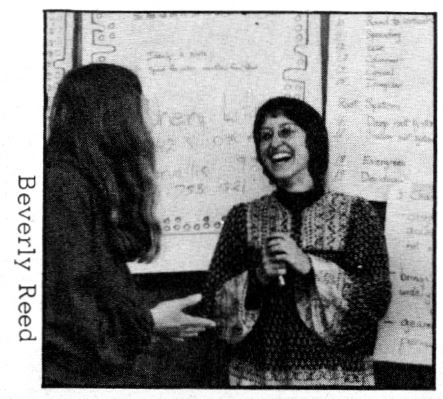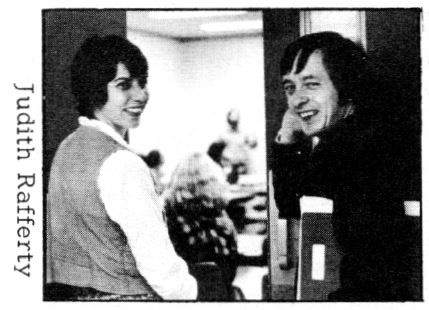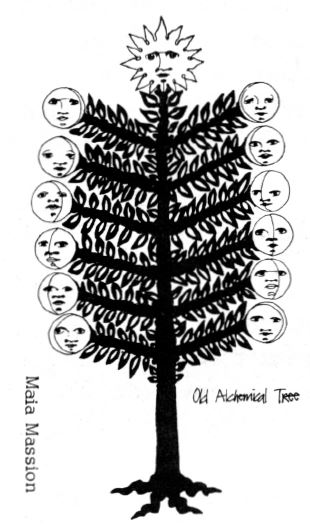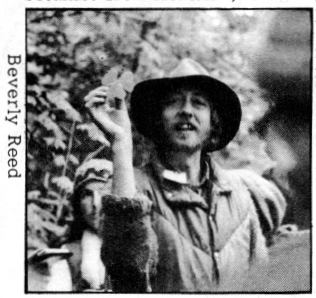The Permaculture Conferences provided a unique opportunity for people to share ideas and information on numerous projects underway in the Northwest. The projects described on these pages are just a sampling of the rich diversity of talent, enthusiasm and resources represented at the conferences.

Tree Friends Tree Sale
PLANT A BIT OF PARADISE! That's the slogan of the Friends of the Trees, and over the past four years they've been helping people in Northeast Washington and Northern Idaho do just that with their annual Spring Tree Sale.
Begun in 1978 by a small group of tree friends in Stevens County, Washington, the tree sale has gained in popularity and is providing a tremendous service to the people and the ecology of the Northwest Interior. This year 12,000 trees were distributed by the Friends of the Trees in Washington and Northern Idaho.
As the sale has grown, so has the diversity of plants offered, with over 50 different trees, shrubs, vines, and berries offered in the spring of '81. A large part of the stock each year is food plants, but ornamentals and plants for windbreaks, shelterbelts and soil conservation are also included.
The Spring Tree Sale is intended to provide hardy plants for the Interior region. This year the sale included Manchurian apricot, Nanking cherry, wild black cherry, American plum, damson plum, quince, four varieties of walnuts, sugar maple, lilac, golden willow, Siberian pea-shrub, honey locust, apples, strawberries, raspberries, and elderberries. With a selection like that, people can definitely plant a bit of paradise!
Begun by Michael Pilarski, founder of Friends of the Trees, the service has expanded and an independent sale was conducted this year by the group which formed North Idaho Tilth. To encourage more people to sponsor their own local tree sales, Michael has written a description of how the Spring Tree Sale was organized, for publication in the next issue of Tilth.
Faust Bio-Agricultural Services 
ROBERT FAUST, in an impromptu introduction to his Biological Agriculture Workshop, gave one of the most stimulating presentations at the Idaho conference. Robert has worked for years helping farmers in southern Idaho successfully switch to biological practices. Details on his approach, as well as tools and services, are described in a 48 page catalog available for $1 from Faust Bio-Agricultural Service, P. 0. Box 1150, Twin Falls, ID 83301.
The Plant Species Index
SHERY LITWIN'S proposal for a regional Plant Species Index sparked an enthusiastic response at the Maritime Permaculture Conference. Using a key sort card system, it would be possible to access information on a wide' range of locally adapted plants based on dozens of criteria.
According to Shery, "This index is intended to be used as a tool for people setting up and /or working with outdoor, managed plant communities-for gardeners, landscapers, homesteaders, and small farmers in particular." Her proposal is to organize trees, shrubs, vines, and herb layer plants by criteria such as physical characteristics, height, form, life span, hardiness, soil requirements, and uses. Then, it could become an invaluable tool for landscape and permaculture design.
 Shery's work thus far has centered on the design of the indexing system. Actually coding the hundreds of useful plants in the Northwest will require a great deal of time and extensive research. With the basic concept outlined, Shery is seeking sources of funding to actually implement the indexing system. In the meantime, she has agreed to work with Tilth on the plant index for the permaculture book.
Shery's work thus far has centered on the design of the indexing system. Actually coding the hundreds of useful plants in the Northwest will require a great deal of time and extensive research. With the basic concept outlined, Shery is seeking sources of funding to actually implement the indexing system. In the meantime, she has agreed to work with Tilth on the plant index for the permaculture book.
Shery is seeking help in making the Plant Species Index as effective a tool as possible. First, she would like suggestions on specific reference works, charts and other models for use in developing and refining the index. And second, she is seeking sources of funding for the research involved as well as suggestions of marketing strategies for when the index is completed. If you can help in any way, contact Shery Litwin in care of Tilth in Arlington.
Computer Networking
NANCY COSPER AND STEVE JOHNSON, of Rain Umbrella in Portland, facilitated an experimental computer link between the Maritime Permaculture Conference, a simultaneous Northwest food system conference in Pendleton, Oregon, and two national computer networks. The demonstration was initiated by Randy Son of the Washington Small Farm Network (WSFN), who is doing research on the potential of computer networking for small farmers.

A series of technical problems restricted the demonstration at the conference. The experiment did, however, provide an exciting glimpse at the promise of computer technology.
A 75 page print-out of the computer conference demonstration is available for $3 from WSFN, 19 E. Poplar, Walla Walla, WA 99362.
Children of the Green Earth
"I have a dream of the earth made green again, an earth healed and made whole through the efforts of children."
--Richard St. Barbe Baker
A group of people in Oregon is working with St. Barbe to make his dream come true. Last year, with the help of St. Barbe, Dorothy MaClean and René Dubos formed Children of the Green Earth. The goal of Children of the Green Earth is to facilitate tree planting and education programs for children throughout the world.
Children have a natural vision of a whole and unified earth. The Children of the Green Earth is a movement to nurture these special w hole visions of children throughout the world by allowing them to express their sense of unity through earth healing projects.
Children of the Green Earth was one of the co- sponsors of the Permaculture Conferences. With Hearthwind School, they cared for the children at the Maritime conference. Activities included tree planting and presentation of a special play for the grownups Saturday night. It was great fun, and people agreed that the children's participation was one of the things that made the conference a very special experience for everyone.
For more information on their world, write to Children of the Green Earth, Hearth- wind Farm, Star Rt, Box 182, Umpqua, OR 97486.
I BELIEVE that this generation will either be the last to exist in any semblance of a civilized world, or it will be the first to have the vision, the bearing, & the greatness to say: 'I will have nothing to do with this destruction of life. I will play no part in this destruction of the land; I am destined to live & work for peace for I am morally responsible for the world of today and the generations of tomorrow.' I PRAY that I may be just to the earth beneath my feet, to the neighbor by my side, and to the light that comes from above & within, that this wonderful world of ours may be a little more beautiful and happy for my having lived in it. SO MAY IT BE.
--St. Barbe Baker
Northwest Chestnut Project
PARTICIPANTS IN THE CHESTNUT WORKSHOP had a rare opportunity to sample cakes made from sweet chestnuts. Once a major tree in the Eastern hardwood forests and a staple food crop, the American chestnut was all but wiped out by blight early in this century.
 Maryanne Caruthers-Akin, a Portland gardener and artist, has initiated the Northwest Chestnut Project to educate people about the history and potential of this once-major tree crop. Her aim is to combine art and agriculture, and she is conducting research on the chestnut as the central focus of earth-related art works.
Maryanne Caruthers-Akin, a Portland gardener and artist, has initiated the Northwest Chestnut Project to educate people about the history and potential of this once-major tree crop. Her aim is to combine art and agriculture, and she is conducting research on the chestnut as the central focus of earth-related art works.
Maryanne is planning to interview leading researchers in this country and photographically document the chestnut industry in Europe. All the materials she gathers will be used to educate people in the Northwest about the chestnut 's potential in our region. " The project," she says, "is like a political campaign for chestnut consciousness. "
Maryanne is currently seeking funding and public support for the Northwest Chestnut Project. For an informative brochure, write to The Northwest Chestnut Project, 2519 NE 14th Ave., Portland, OR 97212.
NEW CHESTNUT AVAILABLE
Speaking of chestnuts, the Summer 1981 issue of Co-Evolution Quarterly reported on the release of a new, blight- free hybrid American chestnut. The tree combines the upright form of the American chestnut with the large, sweet nuts of Asian varieties. And, best of all, it is said to be the first variety proven to be resistant to the chestnut blight in over 60 years. According to the article, both one- and two-year old grafted trees are available. For information write to Chestnut Hill Nursery, Rt 2, Box 157P, Trenton, FL 32693.
Women of the Trees
 WOMEN OF THE TREES has emerged as an idea for an eco-feminist organization that would support, inform and encourage women working towards healing the Earth through reforestation, permaculture, and organic agriculture.
WOMEN OF THE TREES has emerged as an idea for an eco-feminist organization that would support, inform and encourage women working towards healing the Earth through reforestation, permaculture, and organic agriculture.
The Eco-Feminist movement is based on the premise that the goals of feminism and ecology are essentially inseparable– in order to heal ourselves /heal the planet, we must nurture a sustainable relationship of mutual understanding, acceptance and respect for one another and for the Earth as our home.
Trees have traditionally been a symbol of life, knowledge, and permanence. The vision of Women as Healers of the planet is embodied in the image of Gaia's Daughters planting trees.
As an organization, Women of the Trees could help promote a sense of unity and interconnectedness among women who are already working in the fields of forestry and agriculture. It could also function to provide resource information access to women who are interested in becoming involved with reforestation or tree-crops culture.
Very much welcome, especially at this formative phase, are all inquiries, words of advice and support, and suggestions concerning the possibilities potential of a Women of the Trees organization. Contact Mata Massion, 835 Delaware St., Berkeley, CA 94710.
The Bamboo Project
JIM ORJALA captivated people with his slide show on the potentials for bamboo in the Northwest. Jim is a member of Aprovecho, an international appropriate technology organization based in Eugene, Oregon.
Trained as an architect, Jim traveled throughout Latin America where he discovered the multiple uses of bamboo and its vital importance to people around the world. Upon returning to Eugene, he discovered that many species of bamboo grow well in our maritime climate.
The Bamboo Project began in 197 9 with the acquisition of a large grove of timber bamboo. The Aprovecho Institute is now investigating cultivation techniques and is developing uses of bamboo for small farms and for low-cost construction. They hope to demonstrate that bamboo has the potential to become a mainstay of local self-reliance.
In addition to The Bamboo Project, Aprovecho ho is best known for its development of the Lorena system of fuel-conserving, sand-clay stoves, now in use in a dozen countries. This spring they began publication of Cookstove News, a newsletter which serves to link the international network of people developing cookstoves. Other projects include development of appropriate low - cost housing, the development of windmills for pumping water and generating electricity, solar greenhouses, and solar water heaters. Aprovecho members also conduct a course on appropriate technology at Oregon State University.
Aprovecho is currently working with the Oregon Community Land Trust to acquire land for a rural demonstration center. A major aspect of the project would include establishment of a permanent bamboo research center. Goals of the center would be to cultivate a wide range of bamboo species, develop skills and techniques for working with bamboo, demonstrate the production of bamboo on small acreages in our region, and provide an educational center for bamboo and other aspects of appropriate technology for communities both in the Northwest and throughout the world.
Aprovecho is currently seeking help and support in two forms. First, they are looking for a botanist or an agriculturalist to work with them in the development of The Bamboo Project. And second, they are currently seeking financial support in their effort to establish a rural center. Please contact the institute is you can help in either of these areas. For more information write Aproveeho, 442 Monroe St., Eugene, OR 97402, or phone (503) 683-2776.
Tom Ward’s Herb Book
 EARLY MORNING HERB WALKS with Tom Ward were a highlight of the Portland Conference. Tom, a botanist from Ashland, Oregon, has been teaching people for years about gathering wild herbs in the Northwest. He is now writing a new book on the ecology and use of medicinal herbs, and he needs help with getting it published.
EARLY MORNING HERB WALKS with Tom Ward were a highlight of the Portland Conference. Tom, a botanist from Ashland, Oregon, has been teaching people for years about gathering wild herbs in the Northwest. He is now writing a new book on the ecology and use of medicinal herbs, and he needs help with getting it published.
Tom Ward’s herb book will emphasize herbs as part of our ecological context and their role in the design of permaculture landscapes. It will include sections on the history and theory of herbal medicines, and a description of their uses. The chapter on gathering will provide insight into the ecology of wild herbs and their place in natural systems. Through a series of essays, Tom will lead readers on herb walks and de-mystify plant identification. It will also include an extensive plant list. In all of this, Tom promises that the book will read well and be written in a language that can be easily understood.
As the first book on the gathering and use of medicinal herbs from an ecological point of view, Tom's work will be a major contribution to permaculture in the Northwest. Tom estimates that the book will total about 350 pages, and it is now over two-thirds complete. There are still several months of work to be done on the project and Tom needs some help. First, he could use some funding so that he can keep his farm together and pay the bills while he completes the book. And, of utmost importance, he needs to find a publisher to produce and distribute the book. If you can help with either of these items, contact Tom Ward, P. O. Box 1282, Ashland, OR 97520, (503) 488-0462.


